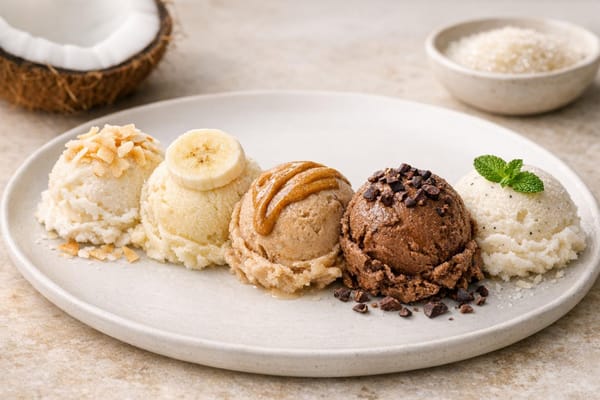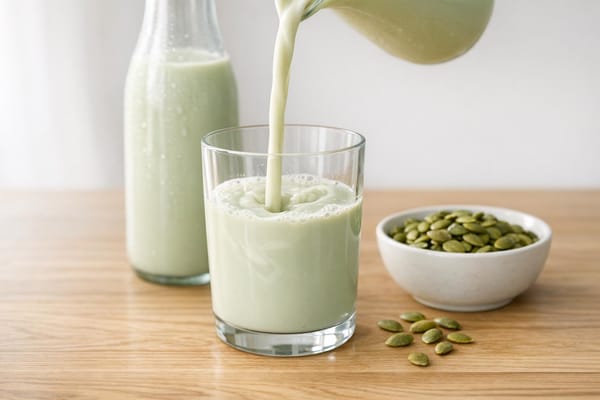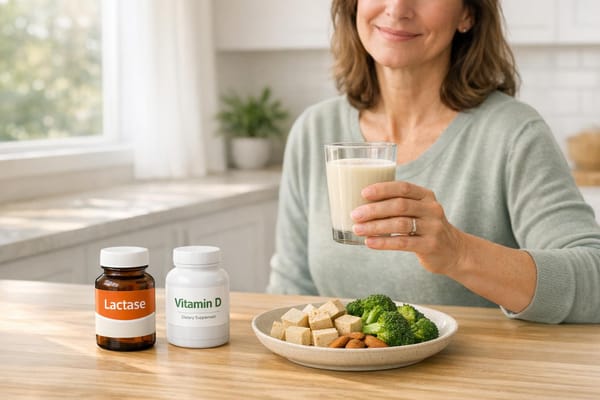How Lactose Intolerance Affects B12 Levels
Lactose intolerance can lead to vitamin B12 deficiency due to reduced dairy intake; explore solutions and alternatives for maintaining B12 levels.

Lactose intolerance can lead to vitamin B12 deficiency because dairy is one of the best sources of this essential nutrient. Without enough lactase enzyme to digest dairy, many people avoid milk, cheese, and yogurt - key contributors to daily B12 intake.
Key Points:
- Why It Matters: B12 is critical for red blood cell production, brain function, and DNA synthesis. Adults need about 2.4 mcg daily.
- Dairy's Role: Milk and cheese provide highly absorbable B12. For example, one cup of milk covers 46% of your daily B12 needs.
- Risk of Deficiency: Avoiding dairy reduces B12 intake and absorption, increasing the likelihood of deficiency, especially in lactose-intolerant individuals.
- Solutions:
- Use lactase supplements to digest dairy without discomfort.
- Opt for fortified foods like plant-based milks or cereals.
- Consider B12 supplements to meet daily requirements.
By understanding the link between lactose intolerance and B12 deficiency, and exploring alternatives, you can maintain healthy B12 levels without relying solely on dairy.
Causes of Vitamin B12 Deficiency | In-Depth Overview including Medications, Diseases & Fish Tapeworm
Why Dairy Matters for Vitamin B12 Absorption
Dairy is a powerhouse when it comes to providing vitamin B12 in a form that's easy for the body to absorb. For example, just one cup of whole milk delivers 46% of your daily B12 needs, while Swiss cheese offers 28%. Interestingly, research shows that the B12 from milk and dairy products is absorbed more effectively than the B12 found in beef, fish, or eggs.
How Dairy Improves B12 Absorption
The proteins in milk play a significant role in boosting B12 absorption. Milk contains specific proteins like transcobalamin (TC) and haptocorrin (HC), which bind to vitamin B12 and enhance its absorption. Casein, the main protein in milk, also helps bind B12. A study in Norway found that consuming dairy leads to the most significant increase in blood plasma B12 levels compared to other food sources.
Here’s a comparison of B12 absorption rates from different foods:
| Food Source | B12 Absorption Rate |
|---|---|
| Milk | 65% |
| Fish Meat | 42% |
| Chicken Meat | 61–66% |
| Sheep Meat | 56–89% |
| Eggs | <9% |
Notably, the natural B12 in cow’s milk is absorbed twice as efficiently as the synthetic version found in supplements. This unique ability of dairy to enhance absorption makes it a standout source of this essential nutrient.
B12 Content in Different Dairy Products
The high absorption efficiency of dairy explains why it’s such a reliable source of vitamin B12. Studies have shown that older adults who get their B12 primarily from dairy products are less likely to face a deficiency compared to those relying on meat. Cow’s milk contains between 0.6 and 3.6 nanomoles of vitamin B12 per liter.
Cheese also packs a punch when it comes to B12. Research indicates that the B12 in cheddar cheese is absorbed twice as well as the synthetic B12 in fortified foods like enriched tofu. A long-term study involving 1,753 older adults revealed that higher B12 intake from dairy products was strongly linked to a lower risk of deficiency.
For individuals with lactose intolerance, avoiding dairy can mean missing out on both the quantity and the highly absorbable form of B12 that dairy provides. This makes it especially important to find alternative ways to meet their B12 needs.
How Lactose Intolerance Reduces B12 Levels
When people with lactose intolerance experience symptoms like bloating, diarrhea, and stomach cramps after consuming dairy, they often choose to avoid these foods entirely. This enzyme deficiency not only causes immediate digestive discomfort but also has a ripple effect on overall nutrition. Symptoms such as flatulence, cramps, and nausea can appear within hours of consuming dairy. As a result, avoiding dairy products eliminates a major dietary source of vitamin B12.
Dairy products are a key contributor to vitamin B12 intake. According to a 2024 study analyzing NHANES data (2015–2018), dairy accounts for 25% of the total vitamin B12 intake among adults aged 19 and older. When this source is removed, the likelihood of developing a deficiency increases significantly.
How Reduced Dairy Intake Affects B12 Deficiency Risk
The link between avoiding dairy and vitamin B12 deficiency becomes clearer when considering the prevalence of lactose intolerance. About 70% of adults worldwide produce limited amounts of lactase, the enzyme needed to digest lactose properly. This widespread limitation means many people lose access to a primary, highly absorbable source of vitamin B12.
Studies show that those with lactose intolerance often consume fewer essential nutrients compared to individuals who tolerate dairy. For instance, lactose-intolerant individuals typically consume between 388 and 739 mg of calcium daily - far below the recommended 1,000 mg per day - a pattern that also extends to vitamin B12 intake.
Misunderstandings about lactose intolerance can further exacerbate the problem. Kuda Lamin-Bangura, MPH, MS, RD, and Senior Vice President of Scientific Affairs at the National Dairy Council, highlights the issue:
"The biggest false narrative is that all Black Americans are lactose intolerant, so they should avoid all dairy foods... without getting an official diagnosis from a doctor, it's a perceived lactose intolerance."
These misconceptions often lead to unnecessary restrictions that impact vitamin B12 levels, even for individuals who might tolerate some dairy products.
B12 Deficiency Rates Among Lactose-Intolerant Individuals
The consequences of reduced dairy intake are evident in vitamin B12 deficiency statistics. In the United States and United Kingdom, about 6% of people under 60 are deficient in vitamin B12, while nearly 20% of those over 60 face the same issue. In regions with higher rates of lactose intolerance and lower dairy consumption, the risk is even greater. For example, in Latin America, clinical or subclinical vitamin B12 deficiency affects approximately 40% of the population. Similarly, in areas with high lactose intolerance rates - such as Kenya, where 70% of schoolchildren are affected, and India, where 80% of preschool-aged children and 70% of adults are lactose intolerant - deficiency rates are alarmingly high.
Eliminating dairy without finding alternative sources of vitamin B12 can significantly increase the risk of deficiency. Among older adults, an estimated 5% to 15% experience vitamin B12 deficiency, which, if untreated, may lead to irreversible neurological damage.
Adding to the challenge, lactose intolerance often develops in adulthood, typically between the ages of 20 and 40. For those who previously relied on dairy as a primary source of vitamin B12, this dietary shift requires finding suitable replacements to avoid deficiency.
Addressing these risks is crucial. By adopting targeted dietary strategies, individuals can maintain healthy vitamin B12 levels even if they avoid dairy products.
Why B12 Absorption Becomes Harder Without Dairy
Cutting out dairy from your diet doesn’t just mean losing a major source of vitamin B12 - it also means missing out on the proteins in dairy that help your body absorb this essential nutrient. Without these natural helpers, absorbing B12 becomes a tougher challenge.
Missing Milk Proteins That Aid B12 Absorption
Dairy contains specific proteins, like transcobalamin, that play a big role in transporting vitamin B12 into your intestinal cells. For example, this protein, found in cow’s milk, acts like a delivery service, ensuring B12 gets where it needs to go more efficiently.
The NuAge study highlights the importance of even small amounts of dairy-derived B12. Just 2.50 mcg of B12 - a serving you could get from 1 oz of Swiss cheese, 1 cup of milk, or ¾ cup of Greek yogurt - can significantly lower the risk of deficiency. When dairy is removed from the diet, the body loses these natural transport proteins and has to rely on less efficient methods to absorb B12 from other sources. This makes it harder to maintain healthy B12 levels, even if you’re eating other B12-rich foods.
Challenges with Non-Dairy B12 Sources
Non-dairy B12 options, like fortified plant milks or nutritional yeast, don’t contain the absorption-friendly proteins found in dairy. This makes them less effective, especially for older adults, who already face challenges in absorbing B12. Vegans who don’t take supplements or eat fortified foods are particularly vulnerable to deficiency.
Even if you’re eating plenty of non-dairy B12 sources, your body may struggle to absorb enough without those natural enhancers. This means you’d need to consume much larger quantities to meet your needs, which isn’t always practical.
For those who are lactose intolerant, there’s a workaround. Products like milktab’s lactase pills allow individuals to enjoy dairy without discomfort. These pills, containing 27,000 FCC units of lactase along with protease and lipase enzymes, make it possible to reap the absorption benefits of dairy-derived B12 without the digestive issues that come with lactose intolerance.
Solutions for B12 Deficiency in Lactose-Intolerant People
Eliminating dairy can make managing B12 levels more challenging, but there are practical ways to ensure you meet your nutritional needs. With careful dietary planning and, in some cases, the controlled reintroduction of dairy, lactose-intolerant individuals can maintain healthy B12 levels.
Planning Your Diet and Tracking B12 Intake
Strategic food choices and regular monitoring are key to preventing a B12 deficiency. Adults typically require about 1.5 micrograms of vitamin B12 daily. For those avoiding dairy, fortified foods are an excellent option. For instance:
- Fortified soy milk: About 2.07 micrograms of B12 per cup
- Fortified rice milk: Roughly 1.54 micrograms per cup
- Nutritional yeast: Approximately 150 micrograms of B12 per 100 grams
- Fortified cereals and energy bars: Around 1.3 micrograms per 100 grams
If fortified foods aren’t enough, supplements are a dependable alternative. The Vegan Society provides clear guidance on supplementation:
"To get the full benefit of a vegan diet, vegans should do one of the following: Eat fortified foods two or three times a day to get at least three micrograms (mcg or µg) of B12 a day OR Take one B12 supplement daily providing at least 10 micrograms OR Take a weekly B12 supplement providing at least 2000 micrograms."
Regular blood tests are also crucial, especially since studies show that about 40% of vegetarians are B12 deficient. This is particularly important for pregnant women, breastfeeding mothers, and anyone on a strict plant-based diet, as their B12 needs may be higher.
Using Lactase Pills to Digest Dairy Again
For those open to reintroducing dairy, enzyme supplements can offer a practical solution. Lactose intolerance doesn’t have to mean giving up dairy entirely. Lactase pills replace the enzyme your body lacks, making it easier to digest dairy products. Considering that about 70% of adults worldwide have reduced lactase production, these supplements can be a game-changer.
To get the best results, take lactase supplements with your first bite of dairy. Many people with lactose intolerance can tolerate up to 6 grams of lactose (about half a serving of milk) without experiencing symptoms.
For example, milktab’s lactase pills stand out with their triple-enzyme formulation. Each pill contains 27,000 FCC units of lactase, 22,000 FCC units of protease, and 1,000 FCC units of lipase. This combination not only helps break down lactose but also supports the digestion of proteins and fats in dairy, which may improve overall nutrient absorption.
Managing Lactose Intolerance While Getting Enough B12
Balancing lactose intolerance with maintaining sufficient vitamin B12 levels can be challenging, but the right dietary choices and enzyme support can make it manageable.
About 70% of adults experience reduced lactase production over time, making dairy digestion more difficult. To compensate, fortified foods like Malt-O-Meal Raisin Bran, Eden Soy Extra, Oatly oat milk, and Mikadamia macadamia milk can provide a reliable source of B12. Pairing these foods with enzyme support ensures your body absorbs this crucial nutrient effectively.
Interestingly, the B12 found in dairy is more easily absorbed by the body compared to sources like beef, fish, or eggs. Lactase supplements can help unlock this benefit. Products like milktab’s triple-enzyme formulation are designed to break down lactose, proteins, and fats, making it easier to access the rich B12 content in dairy.
Reintroducing dairy into your diet with the help of enzyme supplements not only supports B12 absorption but also complements other dietary strategies for meeting your nutritional needs.
For older adults, regular monitoring is especially important, as 5% to 15% of this group may face B12 deficiency. Registered dietitian Cynthia Sass emphasizes the importance of supplementation:
"A daily supplement is the surest way to meet one's quota [of vitamin B12]"
In addition to supplements, incorporating a variety of fortified foods and planning recipes thoughtfully can help you meet your nutritional goals. Finding what works for your lifestyle is key.
Timing and dosage of lactase supplements are also crucial for improving dairy tolerance. Many individuals can handle up to 12 grams of lactose - the amount in about one cup of milk. To maximize effectiveness, take a lactase supplement with your first bite of dairy and, if continuing to consume dairy, follow up with a second dose 30–45 minutes later.
FAQs
How can people with lactose intolerance maintain healthy vitamin B12 levels without dairy?
Lactose-intolerant individuals can still maintain healthy vitamin B12 levels by turning to non-dairy sources. Many plant-based milks, such as soy, almond, or oat milk, often come fortified with B12. Additionally, nutritional yeast, B12-fortified cereals, and vitamin B12 supplements are great options to help meet daily requirements.
For those who prefer to include dairy in their diet without the discomfort, lactase enzyme supplements can be a helpful solution. These supplements aid digestion and improve nutrient absorption, allowing people to enjoy dairy while effectively managing lactose intolerance.
Why is vitamin B12 from dairy easier for the body to absorb?
Vitamin B12 in dairy is known for being highly absorbable, meaning your body can take it in and use it more effectively than from sources like meat, fish, or eggs. This is thanks to the specific form of B12 found in dairy, along with certain proteins that help with its absorption.
However, for those with lactose intolerance, consuming dairy can be a struggle, which might interfere with absorbing nutrients like B12. Products such as milktab offer a solution by making dairy easier to digest, allowing you to still gain the nutritional benefits, including essential vitamins like B12.
How does lactose intolerance impact vitamin B12 levels and overall health?
Vitamin B12 deficiency can cause a range of health issues, such as anemia, nerve damage, memory problems, and even permanent neurological damage. Common symptoms include trouble walking, numbness, and mental difficulties.
For people who are lactose intolerant, getting enough B12 from dairy products can be challenging. Since dairy is a major source of this nutrient, avoiding it without finding alternative sources or taking supplements can increase the risk of deficiency. Taking steps to address this is key to avoiding these serious health concerns.



